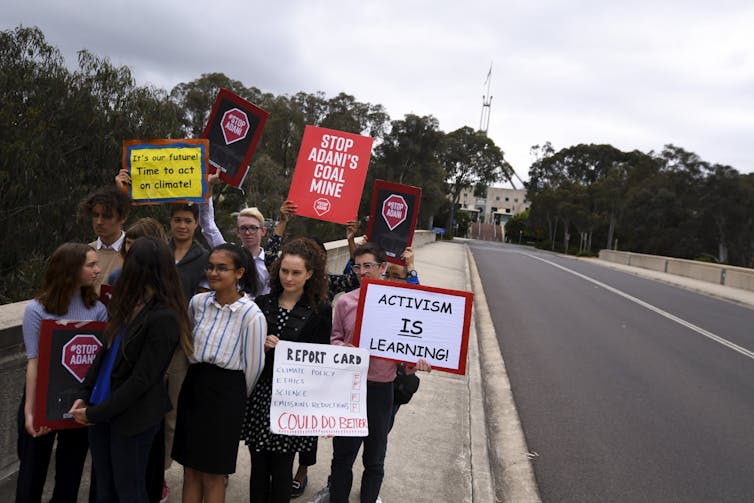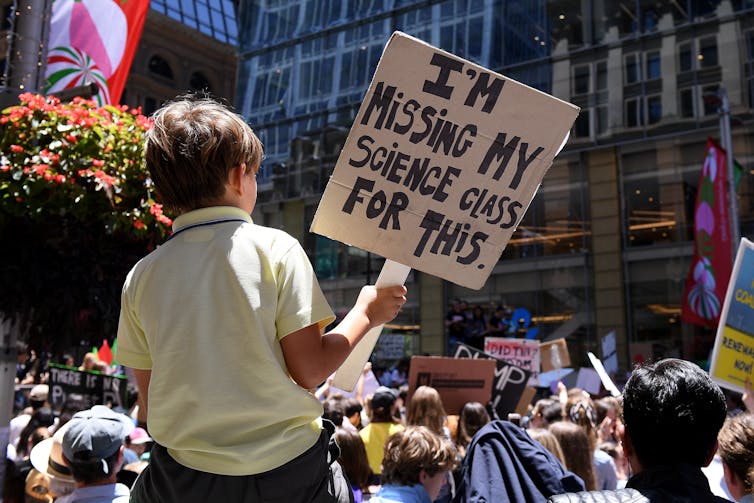Student protests show Australian education does get some things right
- Written by Kellie Bousfield, Lecturer, Charles Sturt University
Australia’s education system often suffers a barrage of criticism – claims of stagnant or declining NAPLAN results, slippage in international comparisons and rankings, and an irrelevant curriculum, tend to draw the attention of politicians, the media, and the Australian public.
It’s not often we are able to celebrate what’s right in Australia’s education system. But yesterday’s student presence at Parliament house and Friday’s protests where more than 15,OOO Australian students skipped class to demand greater action on climate change should be cause for celebration.
Read more: The world needs a new generation of citizen lobbyists
Far from being concerned about an afternoon off school, parents should feel satisfied schools and teachers are doing their job. Participation in these protests meets many of the key goals of our current education system, including students’ capacity to engage in, and strengthen, democracy. Rather than proof of a flawed education system, politically active and engaged students are evidence many aspects of our education system are working well.
Students want action on climate change
Protests called out the federal government’s lack of action on climate change during the protests. Wednesday’s parliament house rally specifically targeted the Adani coal mine project. Students were also seeking an audience with the prime minister to have their concerns heard.
The government’s response to these protests has been, at best, dismissive. Students’ actions have not been recognised as a genuine attempt to engage in robust democratic debate about climate change. Before Friday’s walk-out, Scott Morrison relegated students to the confines of their classrooms, “what we want”, he argued, “is more learning in schools and less activism”.
 The students are right: activism is learning.
Lukas Coch/AAP
The students are right: activism is learning.
Lukas Coch/AAP
Other members of government have been equally off-hand. Senator James McGrath was more concerned with a spelling error on a single student’s placard than the basis of their grievance. Resources minister Matt Canavan deemed protests as nothing more than a quick ticket “to the dole queue”.
The government’s response is both misinformed and misdirected. Beyond the obvious lack of recognition of political protest as a fundamental pillar of democracy, and means to political change, it also demonstrates a lack of recognition of the goals of Australian schooling, as outlined in our Melbourne Declaration.
The Melbourne Declaration and the role of education
The Melbourne Declaration on Educational Goals for Young Australians is a document signed by all Australian education ministers which outlines the mandated knowledge, skills and values of schooling for the period 2009-2018. The declaration is a national road map for education and a statement of intent by both federal and state governments, across partisan lines.
The declaration outlines two key goals:
- Australian schooling promotes both equity and excellence
- all young Australians become: successful learners, confident and creative individuals, and active and informed citizens
It’s the first goal that gathers public attention as excellence and equity, in the form of measurable academic outcomes, dominates public discussion (think NAPLAN, My School, and PISA). More often than not, we’re told it’s here we’re getting things wrong.
In the second goal, the declaration attends to the broad purpose and significance of education. That is, the democratic purpose of education, as an avenue for students’ successful participation in civil society. If events of the last week are anything to go by, our students are all over goal two.
 Students at a rally demanding action on climate change in Sydney, Friday, November 30, 2018.
Dan Himbrechts/AAP
Students at a rally demanding action on climate change in Sydney, Friday, November 30, 2018.
Dan Himbrechts/AAP
Sustainability is a stated priority in the Australian curriculum. Beyond understanding sustainable patterns of living and impacts of climate change, students are expected to develop skills to inform and persuade others to take action. Through these protests, relevant sections of the Melbourne Declaration read like a tick-list of student achievement. Students have demonstrated:
- the ability to think deeply and logically, and obtain and evaluate evidence
- creativity, innovation, and resourcefulness
- the ability to to plan activities independently, collaborate, work in teams and communicate ideas
- enterprise and initiative to use their creative abilities
- preparation for their roles as community members
- the ability to embrace opportunities and make rational and informed decisions about their own lives
- a commitment to participate in Australia’s civic life
- ability to work for the common good, to sustain and improve natural and social environments
- their place as responsible global and local citizens.
The Melbourne Declaration is a recognition that education is more than a classroom test and more than measurable results. This is not to suggest the much lauded 3R’s (reading, writing and arithmetic) are not important in education - they are. Rather, it’s an understanding that education and learning is also, and importantly, social, and sometimes immeasurable in nature and practice.
Read more: Why we're building a climate change game for 12-year-olds
Australian students’ activities over the past week evidence their knowledge and capabilities in an education system valuing both economic and democratic functions of education.
Rather than dismiss students’ actions as ill-informed or misdirected, or deny their capacity to effectively participate in democratic processes, we should recognise their learning and achievements. Let’s celebrate this achievement in Australian education, and encourage their capacity as active and informed citizens within our democracy.
Australian students understand progress happens when individuals join together to demand change. Politicians, take heed.
Authors: Kellie Bousfield, Lecturer, Charles Sturt University




